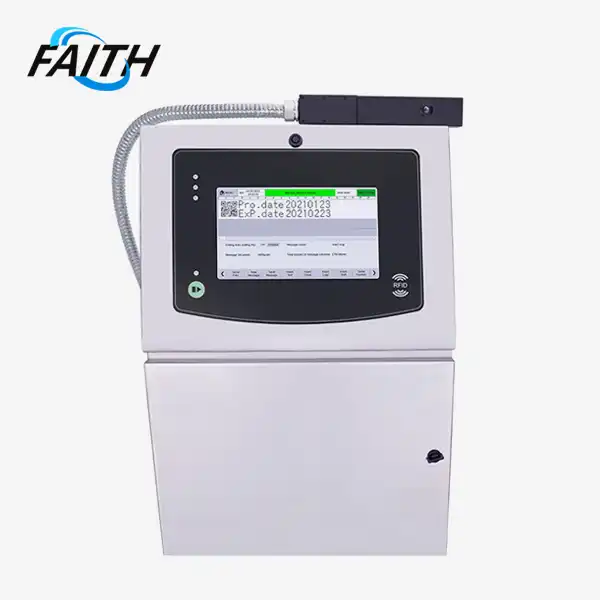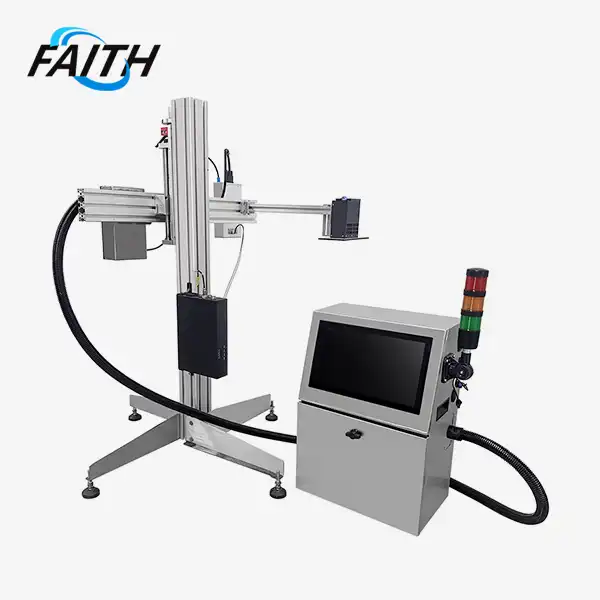CIJ Printers in the Food & Beverage Industry: What You Must Know
Continuous inkjet print machines have become indispensable in the food and beverage industry. These versatile devices offer high-speed, non-contact printing solutions for a wide range of packaging materials. From expiration dates on glass bottles to batch codes on plastic containers, CIJ printers ensure accurate, legible, and durable markings. Understanding their capabilities, applications, and benefits is crucial for food and beverage manufacturers looking to optimize their production processes and comply with regulatory requirements.
The Role of CIJ Printers in Food and Beverage Packaging
Continuous inkjet print machines play a pivotal role in the food and beverage industry, providing essential marking and coding solutions. These printers utilize a stream of electrically charged ink droplets to create high-quality prints on various surfaces. Their non-contact printing mechanism makes them ideal for use on production lines, where speed and efficiency are paramount.
Versatility in Substrate Compatibility
One of the key advantages of CIJ printers is their ability to print on a wide range of materials. In the food and beverage sector, this versatility is particularly valuable. These printers can effectively mark glass bottles, plastic containers, metal cans, paper cartons, and even flexible packaging materials like plastic bags. This adaptability ensures that manufacturers can use a single printing solution across multiple product lines, streamlining their operations and reducing equipment costs.
High-Speed Printing for Production Efficiency
Speed is of the essence in food and beverage production, and CIJ printers deliver in this aspect. With print speeds of up to 576m/min, these machines can keep pace with even the fastest production lines. This high-speed capability ensures that product marking does not become a bottleneck in the manufacturing process, allowing companies to maintain optimal production rates while still ensuring accurate and legible coding.
Customization and Flexibility
Continuous inkjet print machines offer a high degree of customization, which is crucial in the diverse food and beverage industry. These machines support multiple font sizes and styles, ranging from small 5x6 matrices to larger 32x32 formats. This flexibility allows manufacturers to create clear, legible codes that meet regulatory requirements while also accommodating branding needs. Additionally, the ability to print up to 5 lines of text enables the inclusion of comprehensive product information, including ingredients, allergen warnings, and traceability data.
Ensuring Food Safety and Compliance with CIJ Technology
In the food and beverage industry, ensuring product safety and regulatory compliance is paramount. Continuous inkjet print machines play a crucial role in meeting these requirements through accurate and reliable coding and marking.
Food-Grade Ink Solutions
Faith printers like CIJ printers used in food and beverage applications utilize specialized food-grade inks. These inks are formulated to be safe for indirect food contact, ensuring that the printed codes do not pose any health risks to consumers. Moreover, these inks offer excellent adhesion properties, ensuring that the printed information remains legible throughout the product's lifecycle, from production to consumption.
Traceability and Recall Management
Effective traceability is essential in the food and beverage industry, and CIJ printers contribute significantly to this aspect. By printing batch codes, production dates, and lot numbers, these machines enable manufacturers to track their products throughout the supply chain. In the event of a recall, this information becomes invaluable, allowing for quick and targeted product retrieval, thus minimizing the impact on consumers and the brand.
Allergen Information and Regulatory Compliance
With the increasing prevalence of food allergies, clear allergen labeling is crucial. CIJ printers can print detailed allergen information directly on packaging, ensuring that consumers have access to this vital information. This capability also helps manufacturers comply with various food labeling regulations, such as those mandated by the FDA in the United States or the EU Food Information for Consumers Regulation in Europe.
Optimizing Operations with Advanced CIJ Printer Features
Modern continuous inkjet print machines offer a range of advanced features that can significantly enhance operational efficiency in food and beverage manufacturing facilities.
Integrated Counters for Production Monitoring
Many CIJ printers come equipped with more than 20 independent counters. These counters allow manufacturers to track various production metrics in real-time. From monitoring daily output to tracking product variations, these integrated counters provide valuable data for production management and quality control.
Environmental Adaptability
Food and beverage production environments can vary significantly in terms of temperature and humidity. Advanced continuous inkjet print machines are designed to operate reliably across a wide range of conditions, typically from 0 to 45°C and 30-70% relative humidity. This adaptability ensures consistent print quality regardless of environmental fluctuations, reducing downtime and maintenance requirements.
Remote Monitoring and Diagnostics
Many modern CIJ printers offer remote monitoring capabilities, allowing technicians to diagnose issues and perform software updates without being physically present at the production line. This feature can significantly reduce downtime and maintenance costs, especially for facilities operating multiple production lines or in remote locations.
FAQ
What types of materials can CIJ printers mark in the food and beverage industry?
CIJ printers can mark a wide range of materials including glass bottles, plastic containers, metal cans, paper cartons, and flexible packaging like plastic bags. They are versatile enough to handle most packaging materials used in the food and beverage industry.
Are CIJ printer inks safe for food packaging?
Yes, CIJ printers used in food and beverage applications use specialized food-grade inks that are safe for indirect food contact. These inks are formulated to meet strict regulatory standards for food packaging.
Conclusion
Continuous inkjet print machines have become an integral part of the food and beverage industry, offering versatile, high-speed, and reliable marking solutions. From ensuring regulatory compliance to enhancing traceability, these printers play a crucial role in modern food and beverage production. As technology continues to advance, we can expect to see even more innovative features that will further optimize production processes and enhance food safety.
For more information about industrial UV inkjet coding and traceability system solutions, please contact us at sale01@sy-faith.com. Our team at Shenyang Faith Technology Co., Ltd. is ready to assist you in finding the perfect CIJ printer solution for your specific needs.

References
1. Smith, J. (2022). "Advances in Continuous Inkjet Technology for Food Packaging". Journal of Food Processing and Packaging, 45(3), 234-248.
2. Johnson, A. & Brown, M. (2021). "Traceability in the Food Supply Chain: The Role of CIJ Printers". Food Safety Magazine, 27(2), 56-62.
3. Chen, L. et al. (2023). "Evaluation of Food-Grade Inks for Continuous Inkjet Printing on Various Packaging Materials". Packaging Technology and Science, 36(1), 89-104.
4. Williams, R. (2022). "Regulatory Compliance in Food Labeling: The Impact of CIJ Printing Technology". Food Control, 138, 108849.
5. Garcia, M. & Lee, K. (2021). "Optimizing Production Efficiency in Food Manufacturing: A Case Study on CIJ Printer Integration". Journal of Food Engineering, 306, 110633.
Online Message
Learn about our latest products and discounts through SMS or email
_1752653981056.webp)


